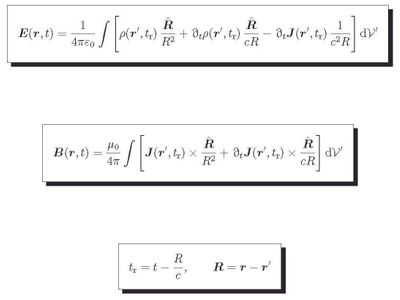- Green's theorems
- Green functions to Poisson's equation
- expansions of Green functions in orthogonal bases
- electrostatic and magnetostatic boundary value problems
- multipole expansions of electrostatic and magnetostatic fields
- magnetic diffusion
- Maxwell's equations
- Green functions to the wave equation
- calculation of retarded fields from continuous sources and point charges
- application of the conservation laws for energy, linear momentum and angular momentum
- analysis of propagation, reflection and transmission of plane waves
- decomposition of fields into plane waves
- the covariant formulation of Maxwell's equations
- application of the Lorentz transformation on 4-vectors and the field tensor.
EI2405 Classical Electrodynamics 7.5 credits

In addition to the introductory courses, this course provides consolidated and enlarged knowledge about electromagnetic field theory, regarding physical understanding and mathematical skill in solving field problems.
Information per course offering
Information for Autumn 2026 TEFRM, TELPM programme students
- Course location
KTH Campus
- Duration
- 26 Oct 2026 - 11 Jan 2027
- Periods
Autumn 2026: P2 (7.5 hp)
- Pace of study
50%
- Application code
10993
- Form of study
Normal Daytime
- Language of instruction
English
- Course memo
- Course memo is not published
- Number of places
Min: 1
- Target group
Mandatory for the Master's Programme, Electromagnetics, Fusion and Space Engineering, (TEFRM). Open for other master programmes as long as it can be included in your programme.
- Planned modular schedule
- [object Object]
- Schedule
- Schedule is not published
Contact
Course syllabus as PDF
Please note: all information from the Course syllabus is available on this page in an accessible format.
Course syllabus EI2405 (Autumn 2021–)Content and learning outcomes
Course contents
Intended learning outcomes
Having passed the course, the student shall be able to:
- solve parts of problems from the major part of the course content
in order to be able to use the electromagnetic laws combined with mathematical methods to solve electromagnetic field problems.
To obtain higher grades, the student shall be able to
- with progression in both completeness and scope, solve problems from the whole course content.
Literature and preparations
Specific prerequisites
- Completed course at first cycle level in electromagnetic theory equivalent to one of EI1220 and EI1320, for the programmes in electrical engineering (CELTE) and engineering physics (CTFYS).
- Completed courses in mathematical methods in physics, containing vector calculus, separation of variables and orthogonal functions.
Literature
Examination and completion
Grading scale
Examination
- TEN1 - Examination, 7.5 credits, grading scale: A, B, C, D, E, FX, F
Based on recommendation from KTH’s coordinator for disabilities, the examiner will decide how to adapt an examination for students with documented disability.
The examiner may apply another examination format when re-examining individual students.
If the course is discontinued, students may request to be examined during the following two academic years.
Examiner
Ethical approach
- All members of a group are responsible for the group's work.
- In any assessment, every student shall honestly disclose any help received and sources used.
- In an oral assessment, every student shall be able to present and answer questions about the entire assignment and solution.
Further information
Course room in Canvas
Offered by
Main field of study
Education cycle
Supplementary information
In this course, the EECS code of honor applies, see:
http://www.kth.se/en/eecs/utbildning/hederskodex.